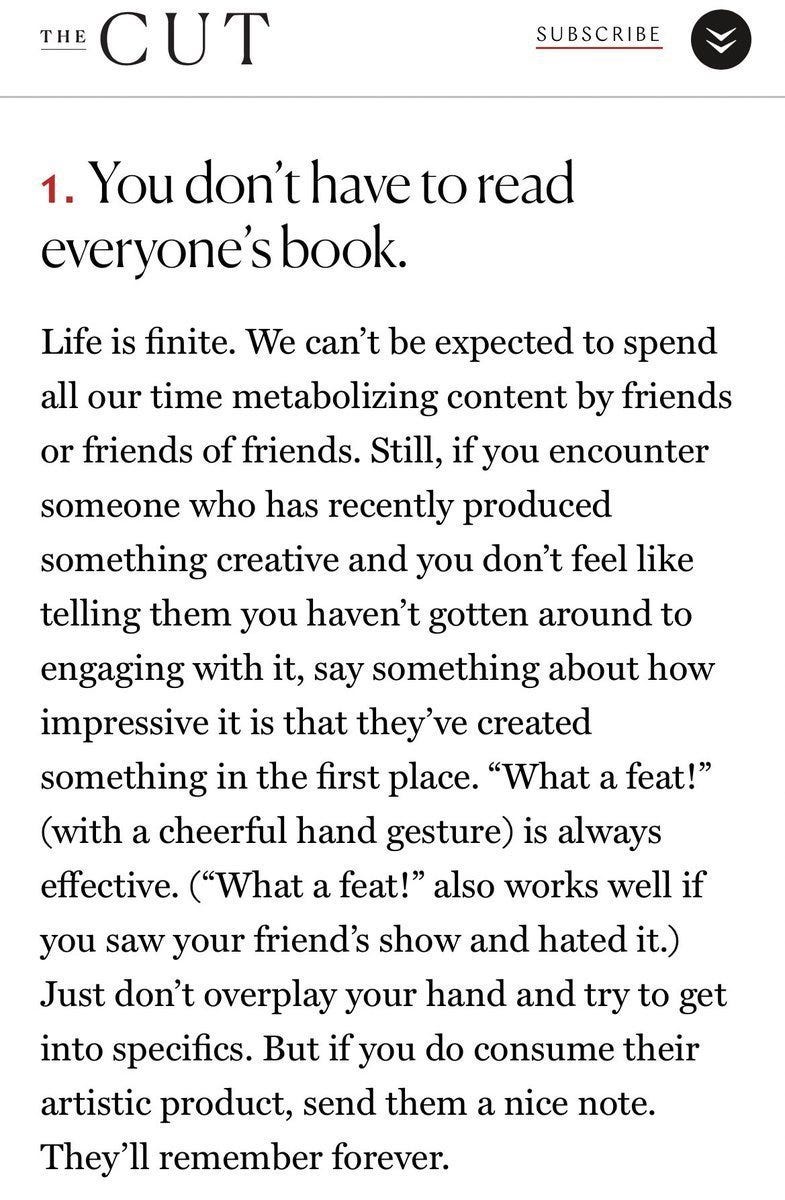Last week, The Cut published a big list of etiquette for the modern age. Bizarrely, their number one rule was about dealing with the fragile egos of authors. (I didn’t know this was the national emergency it apparently is!)
I have some thoughts. But first, for your enjoyment, here’s a photo of Emily Post with her SHOES on the COUCH, which I take to mean you can do whatever the hell you want.
Okay, so here’s what The Cut said. It is absolutely horrible advice.
Yes, it’s true that you don’t need to read everyone’s book. I will never be upset that someone hasn’t read my book, unless they’re supposed to be interviewing me on air or something. But “what a feat” is the most condescending pat on the head. Like, I will leave the party where you said this absolutely seething. Remember how Hemingway said every writer needs a foolproof bullshit detector? Right, so don’t bullshit me.
Also: I need to know a lot more about this cheerful hand gesture. Is it a thumbs up? Is it like a jolly hand wave? Are you literally patting me on the head?
If you are actually interested in protecting the delicate ego of the author in your life, here is what I and the ghost of Emily Post think:
Okay, so what if I haven’t read my friend’s book?
Here are some much more humanoid things to say:
“I’ve heard the most amazing things about it!”"
“I cannot WAIT to read this!”
“Are you happy with how everything’s going?”
“I love your cover. Did you get a say in the art?”
What if I’m broke and/or I don’t want to buy my friend’s book?
Great! Fine! Simply don’t tell your friend. Don’t lie about it, just don’t announce it. Do NOT come up to your friend, who is nervous as hell about sales, and go “Oh, I wish I could buy your book but I can’t, I’m just not buying any new books right now, ha ha, we have too many.” The lines above should work perfectly well instead.
What do I ask at a book event?
Oh hooray!! You are a wonderful person, for you have filled a seat at a bookstore reading, and St. Peter will remember this moment. You do not need to have read the book already. It’s not a book club, it’s a book promotion event. (And you do not need to buy the book—you might already own it, for one thing—but it sure would be great if you bought something from the wonderful bookstore that hosted.) Here are some questions you can ask for almost any book:
-“What was the first passage you wrote, and did it make it into the final version?”
-“What did you end up having to cut that you wish you could have kept?”
-“Who would you cast in the movie?”
-“What did you learn in the research that surprised you?”
-“How do you feel about the book being out in the world now?”What questions are kind of annoying?
The fact that you showed up is so lovely that you’re forgiven just about any question. That said, these might not be the best ones.-“Where did you get the idea for the book?” If it’s an entire novel, there were probably many, many points of origin. An author on tour will have an answer ready, but they’ve already used it twenty times and are sick of the sound of their own voice. Specific questions are a lot more fun. If the novel is, say, set in Tennessee, you could ask “What made you want to write about Tennessee?”
-“What are your writing rituals?” I don’t know who decided writers have rituals, but this makes about as much sense as asking a CPA what their rituals are. Like… I go to Starbucks, and I open up my laptop?
-“How do you balance being a mother with being a writer?” NO.How do I (respectfully) get advice from a writer?
This depends. Are you wanting to become a serious student of writing, and/or are you one already? Or did you crank out a book in two months and you’re hoping this writer you know can tell you the “secret” to getting published?
Most writers teach—either within academia, or at various conferences, libraries, etc.—and you might ask a writer you admire how you could study with them. Many writers are also up for paid manuscript consultation. Rather than ask a writer for their unpaid labor, ask where they teach, or how much they would charge for a consultation.
Once you’ve studied with someone, it’s perfectly fair game to ask them for publishing advice. Or you might ask a writer for resources for learning more about publishing. (Heyyy, here’s one, and here’s another!)
Do not:
-Send a writer your work, unsolicited.
-Ask what the “secret” to anything is.
-Ask a writer who does not know your work to introduce you to an agent or an editor.
- Ask a writer to explain all of publishing to you, without having done extensive research on your own. It’s like walking up to a doctor and saying “Explain to me how I can become a doctor, and what med school is like, and how you choose a specialty, and what your working day is like. Also, how does the human body work?” (Total exemption if you’re under 18 and it’s Visiting Writer Day, and you ask, as if it just occurred to you for the first time, which it maybe did, “How do books get made?”)
-Send your entire novel to a writer and say you hope she’ll enjoy it and give you notes, and then, when she takes the time to write back and say that she wishes you the best but she doesn’t have time to read it, write back and say “I was only intending that you print it out and put it by your bedside and enjoy it as you would any other novel!” and then when she does not respond, write back saying “You’re really missing out on the correspondence we could be having.” Ahem.What should I never say to a writer?
-“I drove around to six libraries just to find your book!” (I believe in libraries like I believe in oxygen. And again, I don’t need you to buy my book. But “I spent $20 on gas so I wouldn’t have to spend $16 on your book” is not the delightful conversation starter you think it is.)
-“That book you’re writing sounds exactly like this other book that’s already out there!” It’s probably nothing at all like that book, and you don’t need to give the author a heart attack. If you must, you might say something like “I’m sure you’ve heard of this other novel that’s also about a potato chip factory, but yours sounds completely different and much better!”
-“I loved your book but I hated the title/cover.” In most cases, it’s not like those were things inflicted upon us.
-“So are you still doing the writing thing?” I still get this, five books in. FIVE. BOOKS. IN. I have had no other job (other than teaching writing) in eleven years. I dunno, Bruce, are you still doing the cardiology thing?
-“I’m so sorry about that mean review.” Nope. You never saw that review. You never even heard about it. What on earth is a “New York Times”?What should I never do to a writer online?
- Tag a writer in a negative (or even mixed) review of their work. Writers can choose to view or not view Goodreads or newspaper reviews. When they’re scrolling Instagram at 11 pm after a bad day, though, they’ll see a post they’ve been tagged in whether they want to or not.
- Comment negatively on a writer in the comments of a post where they’ve been tagged. If you’re about to type “Oh my God, I LOATHED her last book” in the comments, take a second to check whether the author was tagged in the original post, and whether they’ll involuntarily see this when they’re at the vet waiting for their cat to come out of surgery.So how can I support a writer and their work and their fragile ego?
- You can preorder a book. You do that by asking at your local indie, or just clicking “pre-order” online. This works for ebooks and audiobooks, too. Preorders are hugely important because they’re all counted within the first week of sales, which is when authors have their best shot at any bestseller lists. (It would be predictable and obnoxious to link to preorders for my new book here, so instead I’m linking you to Luis Alberto Urrea’s new novel, which looks fantastic.)
- You can review the book on Goodreads or elsewhere. If you know the author in real life, you are absolutely not going to give less than five stars. I don’t care if you save five stars for only your top three books of all time. Debut authors in particular are going to look, and they’re going to see it, and they’re going to be so sensitive about it. Five stars, or your friendship is probably over.
- You can post about their book on social media. Whether or not you’ve read it! As in, “I’m so proud of my brilliant neighbor Daphna, who has published this novel! Here’s a link to buy it!”
- It’s actually traditional in some cultures to come over and do the dishes and laundry for a writer you really like. If you could make everyone aware of that, until it becomes common knowledge, that would be fantastic, thank you.











This post was great, what a feat!
Good other things to say: [BE SPECIFIC]
"Only you, and maybe two other authors, could get me out of the house on a Tuesday night. It was so worth it. Maybe I'll conquer this creeping agoraphobia after all."
"I was secretly hoping you'd read my favorite passage, where _______ discovers that _________ did _________, but the one you chose was even better."
"The [name of fairly well-known author] recommended your book to me. She literally cried, because she found it so moving, but also I think because she wanted to have written it."
"Thank you for the narrator you chose. He made the book into a night at the theater every time I listened, and so I hired him to do my book, and he was just as fantastic." [okay, that one only applies to Rebecca.]
"Do you play music when you write?" [if, yes] Can you post a playlist on your substack?"